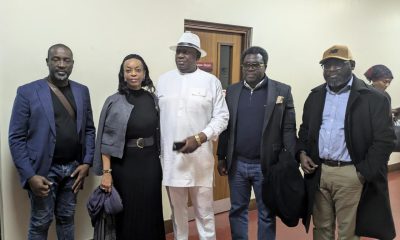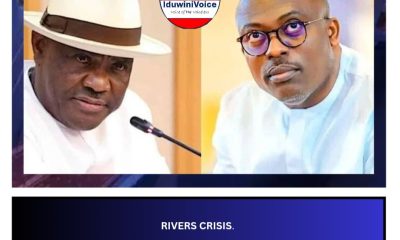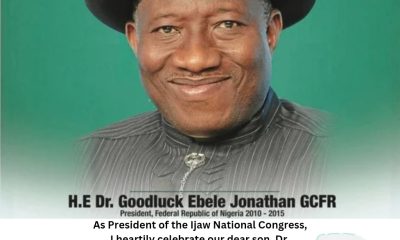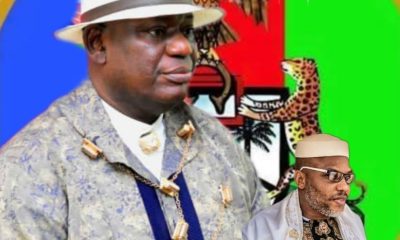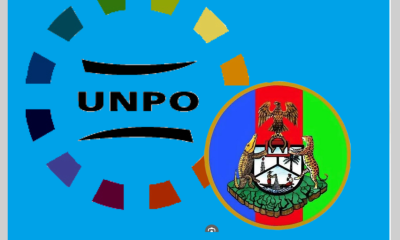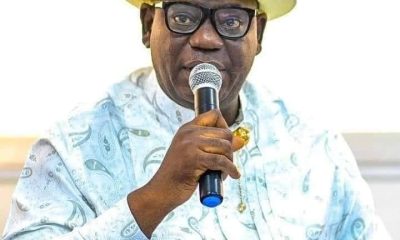Press Statement
INC PRESS STATEMENT: DEMAND FOR THE CREATION OF TORU-EBE STATE (FROM DELTA, EDO, AND ONDO STATES), AND OIL RIVERS STATE (FROM RIVERS AND AKWA-IBOM STATES), RESPECTIVELY: A THOUGHTFUL ACTION FOR PEACE AND PROGRESS OF THE NIGERIAN STATE.
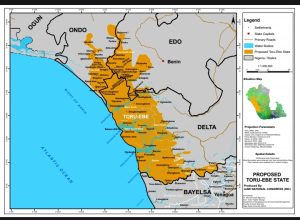
IJAW NATIONAL CONGRESS (INC) WORLD-WIDE.
PRESS STATEMENT, FEBRUARY 5TH, 2025, AT IJAW HOUSE, YENAGOA
DEMAND FOR THE CREATION OF TORU-EBE AND OIL RIVERS STATES (FROM DELTA, EDO, AND ONDO STATES, AND RIVERS AND AKWA-IBOM STATES, RESPECTIVELY): A THOUGHTFUL ACTION FOR PEACE AND PROGRESS OF THE NIGERIAN STATE.
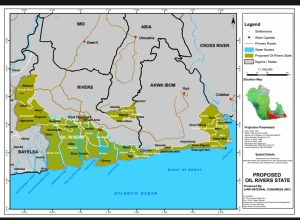
INTRODUCTION
1. The Ijaw National Congress (INC), on behalf of the Toru-Ebe State and the Oil Rivers State Creation Movements, the Ijaw people of Delta, Edo, Ondo, Rivers, and Akwa-Ibom States, hereby issue this Press Statement in respect to our formal request to the National Assembly for the creation of two (2) New states, namely Toru-Ebe State and Oil Rivers State for the Ijaw people of Nigeria. The creation of these two (2) additional states is one of the crucial, sensitive and prescient irreducible conditions for the continuous commitment of the Ijaw people to the Nigerian project.
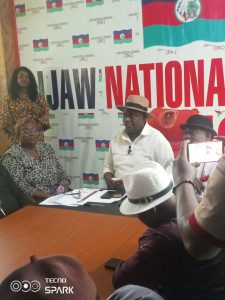
2. For decades, successive Nigerian governments have attempted to address the Ijaw and Niger Delta crisis through interventionist agencies such as the Niger Delta Development Board (NDDB) in 1961, the Niger Delta Basin Development Authority (NDBDA) in 1976, the Presidential Task Force on Oil Mineral Producing Area Development Commission (OMPADEC) in 1992, and the Niger Delta Development Commission (NDDC) in 2000. However, these agencies have failed to provide a lasting solution to the fundamental issues affecting the Ijaw people. As the late Chief Dr. Harold Dappa-Biriye rightly observed, “Physical development cannot be an answer to the political aspirations of a people.”
3. The Ijaw, despite being the fourth largest ethnic group in Nigeria, have only one homogenous state (Bayelsa), which represents less than one-third of the Ijaw population. State creation is the basis for federal representation, and without Toru-Ebe and Oil Rivers States, the Ijaw people will continue to be politically sidelined.
4. This demand is also in line with Section 8(1)(a) of the 1999 Constitution (as amended) and follows previous submissions to various constitutional review committees, including the Mbanefo Committee on State Creation (1996), the National Political Reform Conference (2005), the 2014 National Conference and Senate/House of Representatives Committee on Constitutional Amendment (2021 and 2024).
5. JUSTIFICATION FOR TORU-EBE STATE CREATION
a. The Ijaw people in Delta, Edo, and Ondo States have been systematically balkanized into different states and local government areas, thereby reducing their political influence and preventing fair representation. Despite being the majority in certain areas, they remain politically suppressed, and unabled to hold key leadership positions.
b. Since the colonial era, Ijaw communities have been arbitrarily divided across multiple States. This fragmentation has left them as permanent minorities, who are unable to fully participate in governance and other decision making processes.
c. The proposed Toru-Ebe State is rich in oil and gas, timber, fisheries, and other natural resources, contributing significantly to Nigeria’s economy. However, this territory has suffered severe environmental degradation and lacks commensurate infrastructure development.
d. The ongoing ethnic tensions between the Ijaw and their neighbours in Delta, Edo, and Ondo States stem from political exclusion and resource control struggles. Creating Toru-Ebe State will address these grievances, and ensure long-term peace and stability.
e. The principle of co-terminosity, as emphasized by the political legend Dr. Nnamdi Azikiwe in 1980, states that no ethnic group should be fragmented in a way that makes them minorities in multiple States. The creation of Toru-Ebe State will allow the Ijaw people to govern themselves and determine their future.

5.1 COMPOSITION OF THE PROPOSED TORU-EBE STATE
The proposed Toru-Ebe State will comprise the following local government areas:
Delta State: (Bomadi LGA, Burutu LGA, Patani LGA, Part of Warri South West LGA, Part of Warri South LGA, and Part of Warri North LGA)
Edo State: (Part of Ovia South West LGA, Part of Ovia North East LGA, and Part of Ikpoba-Okha LGA)
Ondo State: (Ese-Odo LGA, and Part of Odigbo LGA)
PROPOSED STATE CAPITAL
The Capital of Toru-Ebe State shall be Burutu Township, the Headquarters of the current Burutu LGA of Delta State.
6. JUSTIFICATION FOR THE CREATION OF OIL RIVERS STATE
a. The failure to provide a political solution to the Ijaw question has led to the persistent crises in the area. The creation of Oil Rivers State will provide the missing political framework necessary to achieve lasting peace, stability, and meaningful development in the Ijaw territory.
b. This territory remains one of the most environmentally degraded areas in the world, with massive oil spills, gas flaring and ecological destruction, threatening the very survival of its people. Existing environmental laws are inadequate and poorly enforced. A state of our own will give us the autonomy to enforce policies that protect our environment and ensure sustainable development.
c. The Willinks Commission Report (1958) acknowledged that development in the (Ijaw) Niger Delta is uniquely challenging due to its difficult terrain. The current state structure has failed to address this, leaving the area without basic infrastructure such as roads, electricity, and healthcare. Oil Rivers State will give us the opportunity to take charge of our own development.
d. Despite being a major contributor to Nigeria’s economy, the Ijaw people receive disproportionately low federal allocations. With only one state of our own, federal funds are distributed unfairly, deepening poverty and underdevelopment. The creation of Oil Rivers State will help correct this economic imbalance.
e. There is no significant federal presence in the entire Ijaw territory – no federal roads, no universities, no specialized hospitals, no infrastructure projects of national significance. Oil Rivers State will serve as a vehicle for attracting much-needed federal investment and infrastructure.
f. Due to political fragmentation, many Ijaw communities face cultural extinction, with some losing their native language and traditions. The establishment of Oil Rivers State will create an environment where Ijaw heritage and identity can thrive.
g. By addressing the political and economic marginalization of the Ijaw people, the creation of Oil Rivers State will foster national unity and strengthen the Nigerian Federation.

6.1 COMPOSITION OF THE PROPOSED OIL RIVERS STATE
The proposed Oil Rivers State consists of the Ijaw LGAs in Rivers State and Akwa-Ibom State viz;
Rivers State: (Engeni LGA, ABUA/Odua LGA, Akuku Toru LGA, Degema LGA, Okrika LGA, Ogu – Bolo LGA, Bonny LGA, Andoni LGA and Opobo LGA)
Akwa-Ibom State: (Eastern Obolo LGA and Ibeno LGA)
PROPOSED STATE CAPITAL
The Capital of the proposed Oil Rivers State is Southern Port Harcourt City.
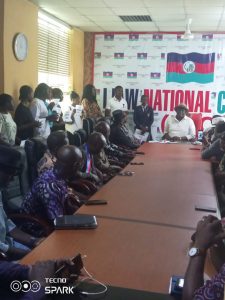
The proposed Oil Rivers State is endowed with abundant natural and human resources, making it economically viable. The state has:
a. Vast Mangrove Forests – Supporting timber, boat building, and furniture industries.
b. Rich Fisheries and Agricultural Potential – Supporting large-scale food production and export.
c. Oil Palm Industry – Reviving the palm oil sector as a major revenue source.
d. Tourism Opportunities – Development of world-class coastal resorts and wildlife parks.
e. Natural Harbours – Enabling trade, commerce, and industrial development.
f. Oil and Gas Resources – With over 30 oil and gas fields, contributing significantly to national revenue.
OUR PRAYER:
We hereby call upon the National Assembly of the Federal Republic of Nigeria to give serious and favorable consideration to our request for the creation of Toru-Ebe State and Oil Rivers State.
The demand for these states is not new. It is a demand rooted in history, fairness, and the survival of our people. We are confident that the creation of Toru-Ebe and Oil Rivers States will be a historic step towards justice, equity, and sustainable peace in the Niger Delta and Nigeria as a whole.
We commend the leadership of the National Assembly for its commitment to transparency, good governance, and national development. We urge them to seize this moment in history and act in the interest of justice.
CONCLUSION
The creation of Toru-Ebe and Oil Rivers States is an urgent necessity, not a privilege. It will correct historical injustices, promote political inclusion, foster economic development, and secure a better future for the Ijaw people. Just imagine, the four (4) major oil export terminals in Nigeria are all located in Ijaw territory (Bonny, Forcados, Escravos and Qua-Iboe terminals), still with nothing meaningful to show for this.
We call on the Senate President, the Speaker of the House of Representatives, and all distinguished members of the National Assembly to prioritize this demand in the ongoing constitutional review process. The Ijaw people have endured decades of political marginalization, and the time for justice is now.
We urge all Ijaw sons and daughters, as well as well-meaning Nigerians, to support this demand for the sake of fairness, equity, and justice.ENDORSEMENT: The originating documents were duly endorsed by Traditional Rulers, Elected Officials, Chiefs, and Eminent Persons of the Proposed Toru-Ebe and Oil Rivers States.
Signed:
Prof. Benjamin Ogele Okaba
President, Ijaw National Congress (INC) World-wide.
Press Statement
PRESS STATEMENT: PANDEF WELCOMES ONGOING REFORMS IN THE OIL AND GAS SECTOR AND DEMANDS FOR GREATER POSITIONING FOR PROFESSIONALS FROM THE NIGER DELTA
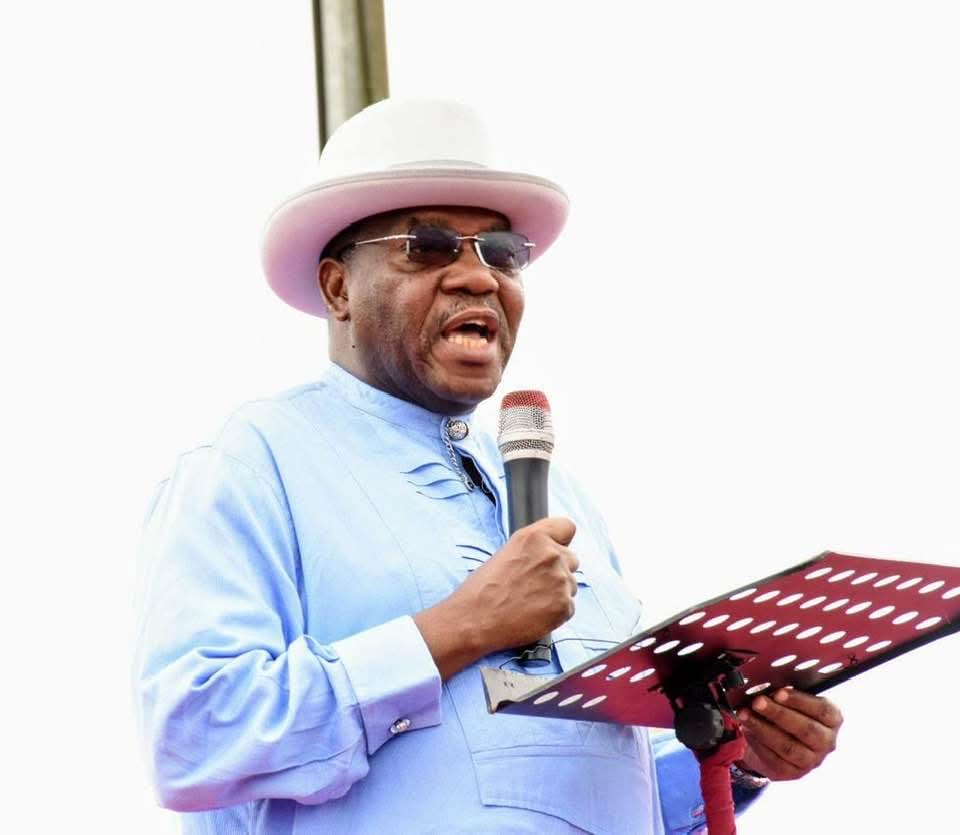
Being Text of Press Statement Issued by the Pan-Niger Delta Elders Forum (PANDEF)
The news of the recent reforms in the regulatory arms of Nigeria’s oil sector has come to the Pan Niger Delta Forum (PANDEF) and indeed the entire Niger Delta with great appreciation and expectation.
We particularly applaud the appointment of one of Nigeria’s most competent professionals in the oil and gas sector, Mrs. Oritsemeyiwa Eyesan as CEO of Nigeria Upstream Petroleum Regulatory Commission (NUPRC). Indeed, this particular appointment could be described as putting a square peg in a square hole, and we thank His Excellency, President Bola Ahmed Tinubu, GCFR, for this.
Mrs. Eyesan, a seasoned economist, has left her mark in the Nigerian petroleum industry, having previously served as Executive Vice President (Upstream) in NNPC. In all her professional life, she has always left a mark of diligence, excellence and impact, wherever she served. She showcases a panache, making all Nigerians, and indeed, our womenfolk exceptionally proud of her service to the country.
It is our belief that, with her in charge of upstream and corresponding appointment of another competent Nigerian, Engr. Saidu Aliyu Mohammed as CEO of the Nigeria Mid-Stream and Downstream Regulatory Authority, Mr. President is set to take the Nigerian oil and gas sector on a quantum leap into the future.
We, the people of the Niger Delta, are greatly impressed with these changes, and hope that the holistic reforms would be sustained. This is the only way to ensure that the oil and gas industry continues to play the paramount role which it has been doing for the common economic interest of all Nigerians and places Nigeria as a dominant player in the global energy architecture.
PANDEF again take this opportunity to express the hope that, as Mr. President will continue to follow through with these reforms in the sector, more sons and daughters of the Niger Delta from where the country has the highest number of experienced professionals in the sector, would be brought into other top positions within the Nigerian National Petroleum Corporation {NNPC} and the industry at large. Furthermore, we look forward to sustained efforts of the Federal Government in putting in place a robust programme for the environmental remediation of the Niger Delta. The Federal Government must go beyond Ogoni Clean-up to ensure that there is budgetary provision on annual basis to clean up the damaged environments of the Niger Delta in a sustained manner.
These changes present another opportunity to call on the Federal Government to put in place a robust programme to promote the building of modular refineries in the Niger Delta. In 2018, government had committed itself to setting up a Modular Refinery Development Fund, similar to the Solid Minerals Development Fund. This must be urgently looked into and encouraged as a way of carrying more host communities along in implementing the Petroleum Industry Act (PIA), creating more economic activities in the Niger Delta and ensuring that the sector has greater stability for the overall good of the country.
Finally, as the apex body representing host communities, PANDEF reaffirms its commitment to working closely with Federal and State governments in mobilising our people to ensure that the right enabling environment exists for this important sector to continue to play its deserved role.
Dr. Godknows Boladei Igali,
National Chairman
Chief Obiuwevbi Ominimini
National Publicity Secretary
Press Statement
PRESS STATEMENT: THE IJAW NATION MUST REMAIN CALM, UNITED, AND STRATEGIC IN THE FACE OF RECENT POLITICAL DEFECTIONS – INC
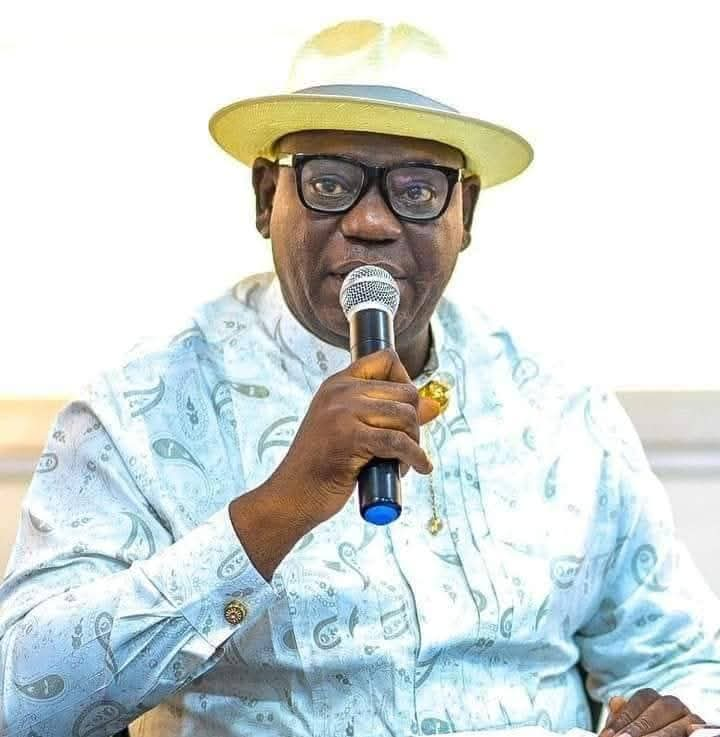
PRESS STATEMENT:
THE IJAW NATION MUST REMAIN CALM, UNITED, AND STRATEGIC IN THE FACE OF RECENT POLITICAL DEFECTIONS
By Prof. Benjamin Okaba, President, Ijaw National Congress
1. The Ijaw National Congress (INC) has observed with keen interest the recent gale of political defections across Nigeria and particularly in Bayelsa State, the epicentre of our national homeland.
While the INC, as a body, remains non-partisan and does not dictate the political choices of our people, we are deeply concerned about the implications of these rapid political realignments on the unity, stability, and long-term strategic interests of the Ijaw nation.
2. We acknowledge the wisdom of those who strongly believe that this move carries inherent dangers that could undermine the Ijaw’s political standing, especially in terms of contribution to a One-Party State, that could diminish their strategic leverage to negotiate between competing national parties, potentially making them politically captive to a single entity; the risk of internal division that could weaken collective action; the erosion of a distinct political identity, by aligning with the party that controls the federal government could be perceived as a dilution of the core Ijaw struggle, trading a principled stance for pragmatic gains and potentially causing ideological confusion.
3. We also fully appreciate the principled position of majority of our leaders who view this move as a strategic calculation, with implications for enhanced national integration; moving the Ijaw from the political periphery—often in opposition—into the center of federal power, a shift from being an “isolated island of opposition” to the “mainland of collaboration”, as this could end a period of political isolation and integrate the Ijaw more fully into Nigeria’s governing structure; a path to economic development, as proximity to the federal government is historically linked to the allocation of resources and projects. To these optimists the Ijaw nation could leverage this new alignment to attract critical federal infrastructure—such as roads, seaports, and power projects—to the difficult terrain of the Niger Delta, addressing long-standing developmental deficits and; that having direct political access for being part of the ruling party grants a seat at the table of national decision-making. This access could allow Ijaw leaders to influence policies directly affecting the region, from oil revenue derivation formulas to environmental regulations and security matters in the creeks, rather than protesting these issues from the outside.
4. In times of such political volatility, it is easy for emotions to run high and for our collective focus to be fractured. Therefore, we issue this statement to call for utmost calm, strategic thinking, and unwavering unity among all Ijaw people, regardless of political affiliation.a. A Call for Composure Over Reaction: We urge our sons and daughters, our leaders and followers, not to be swayed by the transient winds of political expediency. We must not allow these developments to create division, animosity, or internal conflict within our communities. The peace and stability of the Ijaw Nation are paramount and non-negotiable.
b. The Supremacy of the Ijaw Interest: The INC wishes to remind all Ijaw politicians that their primary allegiance is to the Ijaw people. Political platforms are vehicles for advancement, but the destination must always be the development, empowerment, and protection of the Ijaw national interest. We caution against actions that sacrifice our collective destiny on the altar of personal ambition or short-term gains.
c. Guarding Our Political Voice: History has taught us that our strength often lies in our ability to maintain a distinct and formidable voice in the Nigerian federation. We must be strategic and discerning, ensuring that our political choices do not lead to the erosion of our hard-earned political relevance or relegate us to the periphery of national decision-making.
d. Unity as Our Bedrock: Now, more than ever, we must close ranks. The INC will continue to provide a neutral ground for dialogue and engagement to ensure that the Ijaw nation emerges from this period stronger and more cohesive. We warn external forces against exploiting this situation to cause disharmony within our ranks.
The Ultimate Implication: A Test of Strategic Execution
5. In an unbiased assessment, the defection itself is less critical than what follows. The primary implication for the Ijaw nation is that it presents a high-stakes test of political skill. The benefits may not be automatic, and the risks may not be inevitable. The outcome hinges on whether Ijaw leadership can:
i. Achieve Internal Cohesion: Unify the various political factions within and outside the APC to present a solid, common front.
ii. Leverage Access Effectively: Convert the newfound proximity to power into tangible, lasting benefits for the Ijaw people, not just for a political class.
iii. Protect Core Interests: Ensure that the strategic identity and long-standing demands for equity and environmental justice are not silenced but are more effectively championed from within the system.
6. Let it be clear: The Ijaw nation is greater than any single political party or individual. Our journey for justice, equity, and fair inclusion in the Nigerian project is a marathon, not a sprint. It requires patience, wisdom, and a united front.
7. The INC stands ready to guide and provide leadership through this period. We call on all Ijaw socio-cultural groups, youth organizations, women leaders, and traditional rulers to join hands in fostering understanding and a strategic approach to the current political realities.
The Ijaw spirit is unbreakable. Let us navigate this moment with the wisdom of our ancestors and the courage that defines us.
Long live the Ijaw Nation!
Long live the Federal Republic of Nigeria!
Prof. Benjamin Okaba,
President, Ijaw National Congress (INC)
Press Statement
NIGERIA AT 65: A SOLEMN REMINDER OF THE UNFINISHED BUSINESS OF JUSTICE AND SELF-DETERMINATION FOR THE IJAW NATION

PRESS STATEMENT:
October 1, 2025
NIGERIA AT 65: A SOLEMN REMINDER OF THE UNFINISHED BUSINESS OF JUSTICE AND SELF-DETERMINATION FOR THE IJAW NATION
By: Professor Benjamin Okaba
President, Ijaw National Congress (INC)
Yenagoa, Bayelsa State.
On the occasion of Nigeria’s 65th year of political independence, the Ijaw National Congress (INC), the apex socio-cultural and political organization of the Ijaw people, finds no serious cause for any grandiose celebrations, beyond appreciating God and providence for getting us together as one single political entity. Instead, this anniversary serves as a solemn and painful reminder of 65 years of internal colonialism, calculated marginalization, and the systemic expropriation of our wealth and rights.
For the Ijaw nation, the Nigerian project has been a story of broken promises and brazen injustice. While our land and waters have produced the oil and gas that have fueled the nation’s economy for decades, we have been rewarded with nothing but extreme poverty, environmental devastation, and political suppression. The much-celebrated unity of Nigeria remains a myth, built upon the foundation of our oppression.
Our stance is not one of mere grievance, but one grounded in historical fact and legal right. The Ijaw people, as distinct owners of a territory with pre-1914 treaties with the British Crown, never willingly surrendered our sovereignty. The Nigerian state, as it is constituted, has consistently violated the principles of true federalism upon which it was supposedly founded.
The recent political crisis in Rivers State, where the rights of an Ijaw son were trampled with federal acquiescence, is only the latest chapter in this long history of disrespect. It demonstrates a persistent pattern where the might of the state is deployed not for justice, but to subjugate the Ijaw will.
Furthermore, laws like the Land Use Decree, Petroleum Industry Act (PIA) are not instruments of reform but a continuation of the legalized plunder of our resources. Our environment remains a sacrifice zone, with oil spills and gas flaring destroying our ecosystem and livelihoods with impunity.
Given this reality, we have come to a definitive conclusion: the pursuit of justice within the current Nigerian framework is a futile endeavour. Our hope no longer resides within Therefore, on this 65th anniversary, we reiterate our commitment to the Global Awakening of the Ijaw Struggle for Self determination.
We hereby call upon the international community, including the United Nations, the African Union, and all global citizens of conscience, to take note of the plight of the Ijaw people. We invoke the United Nations Declaration on the Rights of Indigenous Peoples to legitimize our quest for self-determination. Our demand is for the right to manage our resources, protect our environment, and determine our political destinies.
Let it be clear: our quest is for justice, not secession by force. We shall pursue this cause through peaceful, strategic, and diplomatic means, as is our right under international law.
To the Nigerian State, our message is this: the Ijaw people can no longer be spectators in a nation built on our backs. The current structure is unsustainable. The time for a sincere national dialogue that addresses the fundamental issues of resource control, true federalism, and the rights of nationalities is long overdue.
Until that day of reckoning, do not expect us to celebrate an independence that has only deepened our chains.
Long live ljaw Ethnic Nation
Professor Benjamin Okaba
President,
Global Ijaw National Congress (INC).

